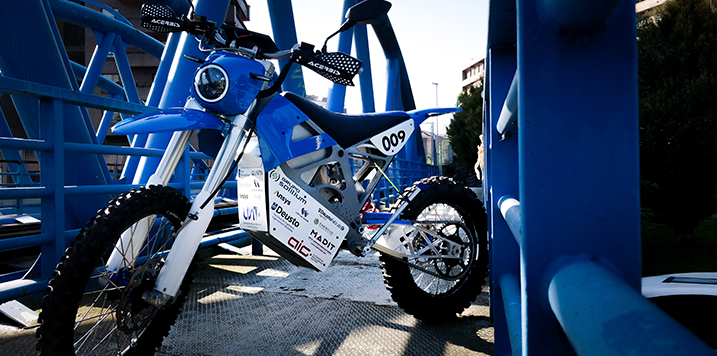 09 April, 2021
09 April, 2021MADIT Metal uses Renishaw’s PBLF (Power Bed Laser Fusion) technology for the Deusto Moto Team (UDMT) project to assist in the manufacture of parts for Spain’s first electric motor with a transmission manufactured using 3D metal printing.
UDMT has established itself as the most pioneering university team by adopting additive manufacture for the transmission system for an electric motorbike. In so doing, the team doesn’t just gain a competitive advantage in the Barcelona Smart Moto Challenge, but it has also developed an innovative solution never used before in the competition.
The Smart Moto Challenge is one of the most prestigious international events in the world of university motorbike competition and its aim is the development of a fully functional electric motorbike. Engineering schools from universities in several countries take part in the event. Teams are assessed in tests of acceleration, braking, rain test, time trial, static-dynamic, etc.
Deusto Moto Team, started in 2014 and known by the initials UDMT, is a team made up of students whose aim is to design and build a smart electric motorbike to compete in Barcelona Smart Moto Challenge. UDMT is made up of around 20 students from the faculty of engineering at Deusto University. In 1977, the university’s Faculty of Engineering was known as the Faculty of Computing. However, it was renamed 20 years later as the Faculty of Engineering because it had expanded into specialist industrial fields such as Industrial Organisation, Design Engineering, Industrial Electronics, Automation and Industrial Technology.
One of the major challenges thrown up by designing an electric motorbike is the design of the transmission, since electric motors generate very high torque and that torque has to be reduced for the vehicle to be drivable. To solve that problem, UDMT’s competition bike has over recent years featured a two-stage transmission which allows smoother reduction of the motor’s torque. Because this design has perfect transmission geometry across the full range of movement of the motorbike’s suspension, the transmission ratio is reduced and it is possible to use motorbike crowns (drive sprockets).
The team implements and uses a wide range of technologies to be able to build the motorcycle, including: IoT, Big Data, virtual reality and 3D printing. They also seek to adopt technologies such as artificial intelligence and machine learning to perform prescriptive and predictive analysis.
The idea of using additive manufacturing for the motorbike’s transmission was to create the first Spanish motorbike to use 3D metal printing and to manufacture parts with leading-edge technology (DEUSTO).
Asier Domínguez and Javier Díaz, the partners in MADIT Metal, see their mission as promoting and offering to industry the advantages of additive manufacturing over other technologies such as machining and metal injection - “3D printing is not particular to any specific sector, but can meet the needs of businesses of all kinds,” says Asier Domínguez. In September 2020 MADIT acquired two RenAM 500M systems from Renishaw. Those two machines, now operating in their premises, have an ultrasound dust recirculation system that minimises exposure of dust to the atmosphere and reduces the risk of cross-contamination, automating the processes and increasing productivity. The machines use InfiniAM Central monitoring and process control software and InfiniAM Spectral laser and melt pool quality control software. MADIT also increased its capacity in January 2021 by the addition of a new AM250 machine for tool fabrication in steel.
Three of the advantages that MADIT offered UDMT, besides being able to use a technology that remains inaccessible in some markets, was shorter delivery times.
For the university team, delivery dates of the manufactured part were vital, even more so in such constrained circumstances. – The team wanted the parts as soon as possible. On the other hand, the RenAm 500M system not only allowed them to reduce production costs, because more than one component could be manufactured on the same plate in the system to provide spares, but also because it enabled UDMT to achieve a reduction of 30% in the weight of parts, a factor of vital importance in the automotive sector. Relative to the competition, the ability to have a lighter part has enabled the team to gain speed and acceleration on the bike.
Subscribe to our newsletter. Just insert your e-mail and you will receive the latest news.